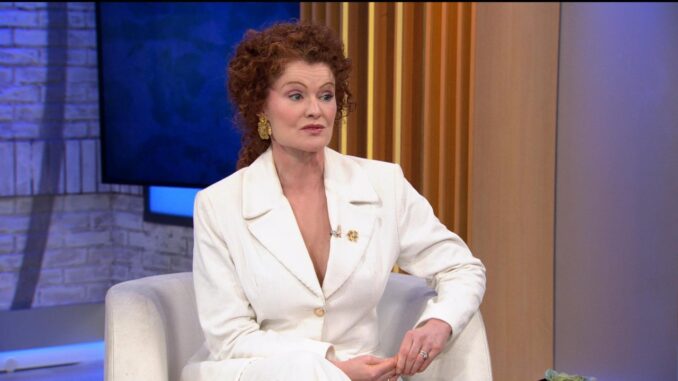
From Hedonistic Haunt to Heartfelt Helper: Rebecca Wisocky on the Spectral Rise of Hetty and the Triumph of "Ghosts"
"Ghosts," the CBS sitcom about a young couple inheriting a haunted house filled with spirits from different eras, isn't just a funny show; it's a masterclass in character development. Nowhere is this more evident than in the transformation of Hetty, the 19th-century socialite played with delightful nuance by Rebecca Wisocky. From a rigid, prejudiced matriarch to a surprisingly compassionate and even vulnerable spirit, Hetty's journey has been a cornerstone of the show's success, and Wisocky's portrayal has been instrumental in making her a fan favorite. This essay will explore the key aspects of Hetty's character twist and the show's rising success, illustrating how Wisocky's performance has breathed life (or rather, afterlife) into a character initially conceived as a caricature, ultimately transforming her into a relatable and deeply human presence, even in death.
Initially, Hetty was presented as a stock character: the uptight, Victorian wife, obsessed with appearances and propriety, quick to judge and slow to forgive. Her dialogue was peppered with antiquated phrases, and her worldview was firmly rooted in the 19th century. However, beneath the corsets and societal expectations, Wisocky hinted at a deeper, more complex individual. Her performance, even in the early episodes, suggested a woman trapped by the rigid confines of her time, a woman who yearned for something more than societal approval. This subtle layering laid the groundwork for the character's eventual transformation.
The show's brilliance lies in its gradual peeling back of Hetty's layers. As the series progressed, we began to see glimpses of the woman underneath the societal conditioning. Episodes delved into her past, revealing the pressures she faced as a woman in the 1800s, the limitations placed upon her, and the sacrifices she made. We learned of her unfulfilled ambitions and her suppressed desires, allowing the audience to empathize with her struggles. This shift wasn't sudden or forced; it was a gradual process, carefully orchestrated by the writers and brought to life by Wisocky's sensitive performance.
One crucial element in Hetty's evolution is her interactions with the other ghosts, particularly those who represent marginalized groups. Her initial prejudices, rooted in the societal norms of her era, are challenged by her forced cohabitation with a Native American, a gay soldier, and a Black jazz singer. These interactions are not always comfortable; they often lead to conflict and misunderstandings. However, through these encounters, Hetty is forced to confront her own biases and begin to understand the perspectives of others. Wisocky expertly portrays Hetty's internal struggle, her initial resistance giving way to reluctant understanding and eventually, genuine empathy.
Furthermore, Hetty's relationship with Samantha (Rose McIver), the living woman who can see the ghosts, is pivotal. Samantha becomes a catalyst for Hetty's growth, offering her a glimpse into a world beyond the constraints of Victorian society. Samantha's open-mindedness and compassion challenge Hetty's preconceived notions, forcing her to question everything she once believed. Wisocky and McIver have a palpable chemistry, and their scenes together are often the most heartwarming and humorous in the show. They represent a bridge between the past and the present, highlighting the importance of understanding and acceptance.
The rising success of "Ghosts" can be attributed to several factors, but the nuanced character development, particularly Hetty's transformation, is undoubtedly a key element. The show is not afraid to tackle complex issues with humor and heart, and it offers a refreshing take on the traditional sitcom format. The relatable characters, each with their own unique quirks and flaws, resonate with audiences of all ages and backgrounds. By taking a seemingly one-dimensional character like Hetty and giving her depth, complexity, and a compelling arc, the writers and Wisocky have created a character that is both hilarious and surprisingly moving.
In conclusion, Rebecca Wisocky's portrayal of Hetty on "Ghosts" is a testament to the power of nuanced character development. Her ability to imbue Hetty with both comedic brilliance and heartfelt vulnerability has transformed the character from a stereotypical Victorian matron into a complex and relatable individual. Hetty's journey, from rigid socialite to empathetic friend, mirrors the show's own rising success, demonstrating that audiences crave characters who are not only funny but also capable of growth and change. As "Ghosts" continues to entertain and resonate with viewers, it is clear that Hetty and Wisocky have played a significant role in solidifying its place as one of the most beloved sitcoms on television. Her spectral rise is not just a narrative twist, but a reflection of the show's commitment to exploring the human condition, even in the afterlife.